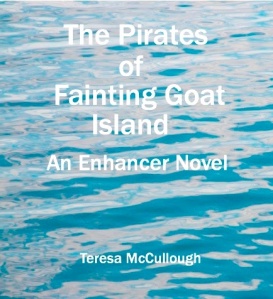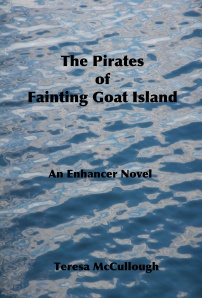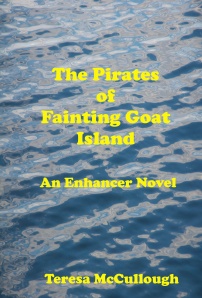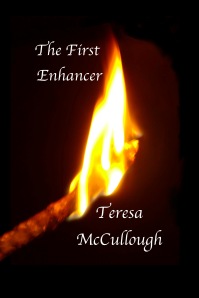My friend Summer Hanford has a short story available on Amazon. It will be free on December 25th and 26th.
Archive for the ‘Writing’ Category
The Fall of Larkesong
December 23, 2013The Pirates of Fainting Goat Island
March 18, 2013I just published The Pirates of Fainting Goat Island.
Heleen’s parents died when a fire burned their home, but Merko, a handsome stranger, pulled her from the burning building. Heleen accepts Merko’s offer of a job, giving her the chance to see more of the world, only to discover he is really offering a kind of captivity and the risk of losing her ability to enhance.
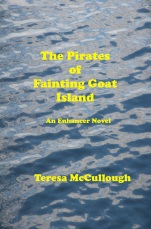
In the course of her adventures, Heleen meets people who worship other gods and have magical abilities and restrictions she hasn’t encountered before. She learns that when every choice is bad, she still has to choose, and when others depend on the choices she makes, it can be impossible to avoid risk and sacrifice. Most importantly, she learns just how far someone will go to protect those they love.
New Enhancer Novel
March 5, 2013In about six weeks I hope to publish another enhancer novel. For earlier novels, I’ve been able to find covers that were relevant to the book and relatively cheap to do. This time I don’t have any cheap ideas. Since writing is a hobby for me, and I don’t want to spend too much on my hobby, I will probably go with a cheaper cover. The title is a mild spoiler. The reader will not know certain characters are pirates until twenty to thirty pages into the book.
After looking at this, I think the printing doesn’t show up well. Here are other possibilities
.
The First Enhancer
March 22, 2012
My new fantasy novel is now available at Amazon in electronic form.
Lanora was given a mission by a god, but she had only her wits to rely on to accomplish it. How could she accomplish her mission, when other gods wanted to stop her?
Fiction and reality, or TSTL
December 10, 2011Sometimes I will read a novel and feel that the protagonist is behaving in a way that doesn’t make sense. TSTL means “too stupid to live” and is a common abbreviation when talking about heroines of romance novels. If the heroine is TSTL, I am not interested in reading about her.
Sometimes I wonder about some of my students. If I were reading a novel, I would have trouble believing that someone who really needed to pass a course would miss ten percent of the class by coming late almost every day. Who would sympathize with such a character?
If a character reads in the syllabus that “Late homework will not be accepted for any reason,” would he expect it to be accepted because he missed class? I would be annoyed if I was expected to identify with such a character in a novel. I also wouldn’t understand the character who claimed he needed to pass the course, but didn’t do the homework.
Novels tend to be more logical than life. I expect characters in novels to be logical and have at least average intelligence. Too bad that people aren’t like that in real life.
What is fantasy?
February 17, 2011I like the definition of science fiction as “possible worlds” and fantasy as “impossible worlds.” I realize there are problems with both definitions, but at least it is a starting place.
There is a tendency for fantasy to ignore logic and plausibility. I don’t mean the wild coincidences, such as the hero finding exactly the right companions for a quest or the prophecy that is only fulfilled because people try to circumvent it. I am talking about the worlds that don’t make sense. Our heroes are constantly fighting predators, but there is not an abundance of prey, is one example. Numerous intelligent species live on the same planet, and they are not widely separated yet no one species was wiped out. There are armies with no visible means of support. Even elves must eat.
Fantasy is better when it is logical and consistent, but so is all literature. There is a tendency for fantasy to ignore logic and assume there are magical explanations for everything. Yet we are supposed to identify with the basic humanity of the characters, even if they are elves, werewolves, or Vulcans.
Professional authors
February 13, 2011I was criticized for talking about my books on Amazon forums after I admitted I write as a hobby. I try not to be too argumentative on these forums, so I’ll keep my answer here. There are very few professional novelists, using the dictionary definition of professional as someone who is “engaged in a specified activity as one’s main paid occupation rather than as a pastime.”
There is a level in between being professional and writing as a hobby. Some people make enough money at it so that their writing becomes a legitimate source of income. I’m not sure where to draw the line between a professional and a hobbyist who makes a bit of money, but I think it has to be in terms of percents, not amounts. I will be generous, and say that an author is a professional if his net income from writing is twenty percent of his earned income. I suspect that still leaves comparatively few professional novelists.
In another Amazon forum, a self-published author asked about the pricing of his book and stated that is wasn’t a 99 cent book because it represented hundreds of hours of writing and editing. The author is missing an important point. Readers don’t really care how long the author spent on a book, they are just interested in the results.
I will continue to write as a hobby, and continue to price my books as cheaply as I can, because it is a hobby. I hope people enjoy what I write, because I’m writing for enjoyment: mine and my readers.
Ode to Editing
November 7, 2010Shouldn’t matter whether I edit.
My book is so clever
It’ll last ’til forever,
But sadly, no one has read it.
Jane Austen and Persuasion
October 3, 2010This is not about Jane Austen’s novel Persuasion, but about persuasion in Jane Austen’s novels. Any fan of Jane Austen knows how Anne was persuaded not to marry the man she loved and how unhappy this made her. However, persuasion is a theme in Jane Austen’s other novels.
Pride and Prejudice: Early in the novel, Bingley, Darcy, and Elizabeth have a discussion about yielding to the persuasion of a friend. Later, Darcy and Miss Bingley persuade Mr. Bingley that Jane doesn’t love him, and he should not marry her. Lady Catherine tries to persuade Elizabeth not to marry Darcy.
Emma: Emma persuades Harriet not to marry Robert Martin and that Mr. Elton loves her and would marry her. Emma is shown to be wrong on what she did.
Mansfield Park: Sir Thomas Bertram as well as Edmund both try to persuade Fanny to marry Mr. Crawford. Jane Austen’s then creates an event which suggests Fanny was correct in refusing Mr. Crawford.
Sense and Sensibility: Edward’s family tries to persuade him not to marry Lucy Steele. They don’t try as hard to persuade him not to marry Elinor. Colonel Brandon’s father’s ward was persuaded to marry against her inclination. That marriage ended disastrously.
Northanger Abbey: General Tilney tries to persuade his son Henry to marry for money.
Lady Susan: Lady Susan tries to persuade her daughter to marry Lady Susan’s choice of a husband, but the daughter ends up marrying Lady Susan’s choice for her own husband.
All these have one thing in common: Someone is trying to persuade someone to change his or her mind about marriage. In the novel Persuasion, the person who does so is treated sympathetically, but most of the other persuaders appear to be in the wrong. This kind of persuasion is a theme running through all of her novels, and Jane Austen seems to be firmly on the side of love.
Writing Class
August 21, 2010I’m taking a writing class online through All Writers were we submit up to 3750 words of our novel each week to be viewed and edited by others in the class. When I signed up, I hoped the class would be small, because that would mean that more time would be spent on my book, but now I wish the class were larger, giving more input.
Each student is supposed to read the others’ works and submit comments. There are only four students in the class, and two of the others submit comments in very different styles. My only complaint is that one of them is is not critical enough. She is more willing to say what she likes than what she dislikes. The third person never submits comments, which means he is taking advantage of us. Oh well, that happens. The teacher submits editing comments, which tells me I need to work on my commas, among other things.
I’m enjoying the experience and hope my writing will improve as a result.

